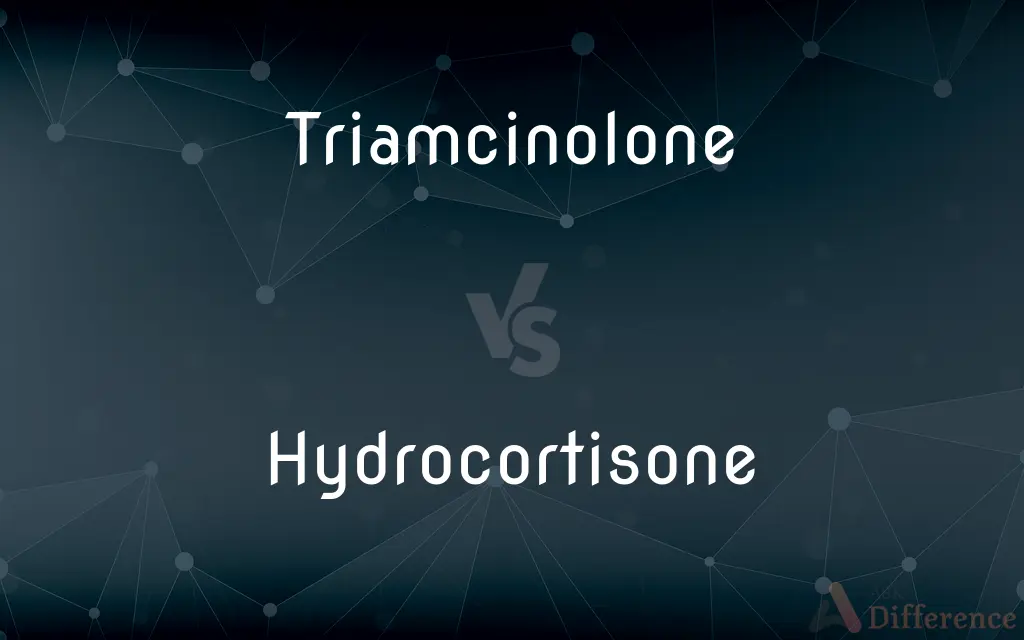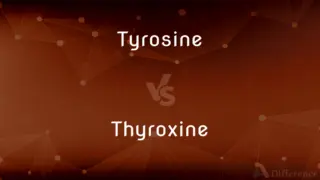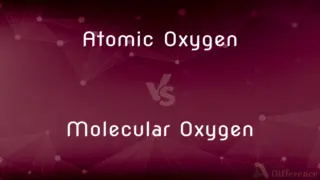Triamcinolone vs. Hydrocortisone — What's the Difference?
By Tayyaba Rehman & Maham Liaqat — Published on June 23, 2024
Triamcinolone is a potent synthetic corticosteroid used for severe inflammation, while hydrocortisone, less potent, is often used for mild skin conditions and as a topical cream.

Difference Between Triamcinolone and Hydrocortisone
Table of Contents
ADVERTISEMENT
Key Differences
Triamcinolone and hydrocortisone are both corticosteroids, but triamcinolone is known for its higher potency and is used to treat more severe inflammatory conditions such as severe allergies, asthma, and certain skin conditions. Hydrocortisone, being less potent, is commonly used for treating mild to moderate conditions like eczema, psoriasis, and other skin irritations, as well as for its systemic effects in adrenal insufficiency.
Triamcinolone is often administered in various forms, including injections, topical creams, and inhalers, to target specific conditions effectively. In contrast, hydrocortisone is widely available in both prescription and over-the-counter forms, including creams, ointments, and oral medications, making it more accessible for everyday use.
The side effects of triamcinolone, given its potency, can be more significant and include skin thinning, increased risk of infection, and adrenal suppression with long-term use. Hydrocortisone, while still carrying risks of side effects such as skin thinning and irritation, generally has a lower risk profile due to its lower potency.
In terms of indications, triamcinolone is often reserved for conditions that do not respond well to less potent corticosteroids due to its strength. Hydrocortisone serves as a first-line treatment for many skin conditions and minor inflammation because of its safety profile and effectiveness in treating a wide range of symptoms.
Both medications interact with the body's cortisol receptors, mimicking the effects of the body's natural cortisol to reduce inflammation and immune responses. However, the choice between triamcinolone and hydrocortisone depends on the severity of the condition being treated, patient-specific factors, and the desired therapeutic outcome.
ADVERTISEMENT
Comparison Chart
Potency
Higher potency, used for severe inflammation.
Lower potency, used for mild to moderate conditions.
Forms Available
Injections, topical creams, inhalers.
Creams, ointments, oral medications.
Common Uses
Severe allergies, asthma, skin conditions.
Eczema, psoriasis, skin irritations.
Side Effects
Skin thinning, infection risk, adrenal suppression.
Skin thinning, irritation, less risk of suppression.
Accessibility
Prescription required for most forms.
Available over-the-counter and by prescription.
Compare with Definitions
Triamcinolone
Triamcinolone is a synthetic corticosteroid for severe inflammation.
Triamcinolone injections are used for severe allergic reactions.
Hydrocortisone
Hydrocortisone is a less potent corticosteroid for skin conditions.
Hydrocortisone cream is commonly used for itching and rash.
Triamcinolone
It is available in multiple forms for different conditions.
Triamcinolone cream is prescribed for certain persistent skin diseases.
Hydrocortisone
Widely accessible in various over-the-counter forms.
Over-the-counter hydrocortisone ointments are available for minor irritations.
Triamcinolone
Primarily prescription-based.
Triamcinolone requires a doctor's prescription for its acquisition and use.
Hydrocortisone
Serves as a first-line treatment for many conditions.
Doctors often recommend hydrocortisone for initial treatment of eczema.
Triamcinolone
Known for its high potency.
Triamcinolone is chosen for conditions unresponsive to milder steroids.
Hydrocortisone
Used both topically and systemically.
Oral hydrocortisone is prescribed for adrenal insufficiency.
Triamcinolone
Can lead to significant side effects with long-term use.
Prolonged triamcinolone use may cause adrenal suppression.
Hydrocortisone
Generally safer with fewer side effects.
Hydrocortisone has minimal side effects when used as directed.
Triamcinolone
A synthetic glucocorticoid, C21H27FO6, used, usually in acetal or acetate forms, in the treatment of a wide variety of inflammatory and allergic conditions.
Hydrocortisone
The steroid hormone cortisol.
Triamcinolone
(pharmaceutical drug) A glucocorticoid steroidal drug 9-fluoro-16-hydroxyprednisolone used chiefly in the form of its acetal or acetate derivatives especially in treating skin disorders, asthma, and allergic rhinitis.
Hydrocortisone
A preparation of this hormone obtained from natural sources or produced synthetically and used to treat inflammatory and allergic conditions and adrenal failure.
Triamcinolone
A synthetic corticosteroid (trade names Aristocort or Aristopak or Kenalog) used as an anti-inflammatory agent
Hydrocortisone
A glucocorticoid steroid hormone C21H30O5 produced by the adrenal cortex upon stimulation by ACTH that mediates various metabolic processes (such as gluconeogenesis), has anti-inflammatory and immunosuppressive properties, and whose levels in the blood may become elevated in response to physical or psychological stress. It is used medicinally to treat inflammation resulting from eczema and rheumatism.
Hydrocortisone
An adrenal-cortex hormone (trade names Hydrocortone or Cortef) that is active in carbohydrate and protein metabolism
Common Curiosities
Is triamcinolone stronger than hydrocortisone?
Yes, triamcinolone is considered stronger and more potent than hydrocortisone.
How quickly does hydrocortisone work?
Hydrocortisone starts to reduce inflammation within hours, but it may take several days for the full effect.
Is hydrocortisone safe for children?
Hydrocortisone is safe for children at lower concentrations, but always under medical supervision.
Can hydrocortisone cream be used on the face?
Yes, but it should be used with caution on the face, and not for prolonged periods.
Can triamcinolone cause weight gain?
Long-term use of systemic triamcinolone can cause weight gain among other side effects due to its potency.
Is hydrocortisone effective for bug bites?
Yes, hydrocortisone can be effective in reducing itching and swelling from bug bites.
Can triamcinolone be used for everyday skin problems?
Triamcinolone is generally reserved for more severe conditions and not recommended for everyday skin problems.
Do triamcinolone injections hurt?
Some patients may experience discomfort or pain during triamcinolone injections.
Can I buy triamcinolone over the counter?
Triamcinolone is not available over the counter and requires a prescription.
Are there natural alternatives to triamcinolone and hydrocortisone?
There are natural anti-inflammatory alternatives, but their effectiveness varies and they may not be suitable for severe conditions.
Is triamcinolone used for psoriasis?
Yes, triamcinolone may be prescribed for psoriasis to reduce inflammation and slow skin cell growth.
How long can I use hydrocortisone cream?
Short-term use is recommended to avoid potential side effects; consult a healthcare provider for guidance.
Can I use expired hydrocortisone cream?
Using expired medication is not recommended as it may be less effective or unsafe.
Does triamcinolone help with acne?
Triamcinolone may be used for severe acne under the guidance of a dermatologist.
Can hydrocortisone treat fungal infections?
Hydrocortisone alone does not treat fungal infections and may worsen them without antifungal medication.
Share Your Discovery

Previous Comparison
Tyrosine vs. Thyroxine
Next Comparison
RAM vs. StorageAuthor Spotlight
Written by
Tayyaba RehmanTayyaba Rehman is a distinguished writer, currently serving as a primary contributor to askdifference.com. As a researcher in semantics and etymology, Tayyaba's passion for the complexity of languages and their distinctions has found a perfect home on the platform. Tayyaba delves into the intricacies of language, distinguishing between commonly confused words and phrases, thereby providing clarity for readers worldwide.
Co-written by
Maham Liaqat














































